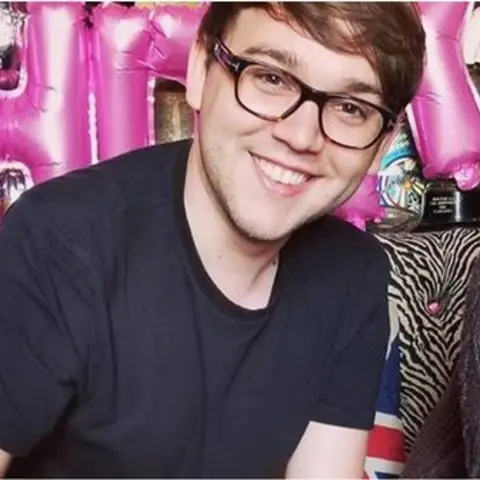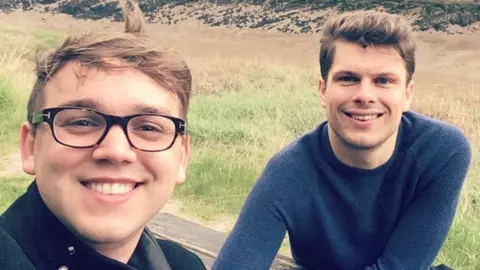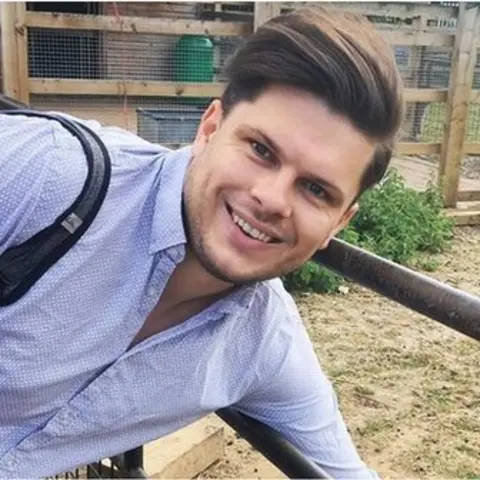'I didn't worry about getting HIV'
 Max
MaxMax is HIV positive, Alex is HIV negative. They began dating two years ago, just after Max learned about his status.
They took part in a landmark health study that proved someone with HIV but on effective treatment could not transmit the virus through sex. They couple have shared their story with BBC Radio 5 live in the hope it will inspire more people to get tested.
Max's story
 Max
MaxI was 24 when I found out I was HIV positive. It was definitely a shock, a punch to the gut. When they told me, I started crying. I didn't know what to do. Should I go back to work or put my life on pause? Should I tell someone? How would I ever find a boyfriend now?
The nurse at the clinic hugged me and said: "Don't worry, everything will be OK." Because I got tested regularly, I found out early, which was good news. The sooner you start treatment, the better.
HIV medication works by reducing the amount of the virus in the blood to undetectable levels. This means the levels of HIV are so low the virus cannot be passed on during sex. Taking my medication has been easy - just one pill a day with dinner. Compare that to my type 1 diabetes, which requires four or five daily injections.
 Max
MaxThe main problem I've experienced has been around mental health - the anxiety caused by telling other people about my status.
In the weeks after my diagnosis, I told all of my close friends and family members. Most of them responded brilliantly but not everyone was so supportive.
I remember telling an older gay mentor, who I had looked up to, and one of the first things he said was: "If I'm looking to have sex with someone HIV positive - which, frankly, I wouldn't - I'd ask myself if they can be trusted to have taken their meds."
I felt he was characterising people with HIV as "reckless" and himself as "responsible" for avoiding contact with us.
This view emerged in the 1980s, when HIV was considered a personal failure or a death sentence. People still associate HIV with those powerful images of gravestones on the television or Princess Diana hugging people in hospital. Many refused to touch us, let alone have any intimate contact. But today, those of us living with HIV can expect to live just as long as anyone else.
My mentor's reaction really affected me. I started having panic attacks. I'd never experienced them before but I couldn't breathe. I couldn't go outside.
It only takes one person treating you differently before you begin to wonder if that's how everyone sees you.
 Max
MaxI met Alex shortly after. We are both academics interested in gender and sexuality, so we bonded over that. He already knew I was HIV positive, so it was never something I had to bring up.
I'm not sure at what point we stopped using condoms. There was no angst about it on his part but I did worry I was pressuring him into not using condoms to make me feel better about my diagnosis.
Last year, we took part in the Partner study, which proved overwhelmingly that people who are undetectable can have sex without condoms and not pass HIV on.
I think if more people knew about this study, there would be far less fear or stigma around HIV - and no one would have any qualms about getting themselves tested.

HIV treatment:
- HIV is treated with antiretroviral medications, which stop the virus replicating
- The amount of the virus in the blood is then measured to see how well treatment is working
- It can take up to six months for this viral load to become undetectable
- People with HIV, on effective HIV treatment and whose viral load has been undetectable for six months or more, can't pass the virus on through sex
- The NHS says a condom is the most effective form of protection against HIV and other sexually transmitted infection (STIs)

Alex's story
 Max
MaxMy first impression of Max was that he was very confident. I met him at a Green Party political conference. I was with a group of young gay guys - we were probably quite intimidating as a collective - and he just walked up to us and said: "Hi."
I found out Max was positive a few days later as he posted his status on Facebook with a picture of his meds.
One of the reasons I was drawn to him was he was so open in discussing it. I've always admired his confidence and his refusal to bow to social pressure.
I also admired the fact that, even when he was dealing with the shock of the diagnosis himself, he was willing to dedicate time and emotional energy to trying to help others.
We met up a couple of months later and it just went from there.
 Max
MaxI didn't feel any trepidation about him being positive. I felt sad, because I knew that he had suffered some stigma in the aftermath of his diagnosis. But that was all about other people's responses, nothing to do with the condition itself.
When it came to having sex without condoms, I didn't worry about getting HIV because I knew he was taking his medication.
I trust him completely. Some people try and undermine the science with claims that positive people won't take their meds. But this is just prejudice. If you're positive, your health depends on taking that one pill a day. It's not something you forget.
I haven't told the entirety of my family about Max's status - I don't think it's significant enough. I did tell my parents before I first brought him back for dinner but that was only because he used to take his meds with food and I didn't want him to have to leave the room.
I think it's a shame that the science of how it can't be passed on hasn't been better publicised. Far too many people are made to suffer stigma for no reason.
People's views about HIV are stuck in the past. We really need to push for change.
